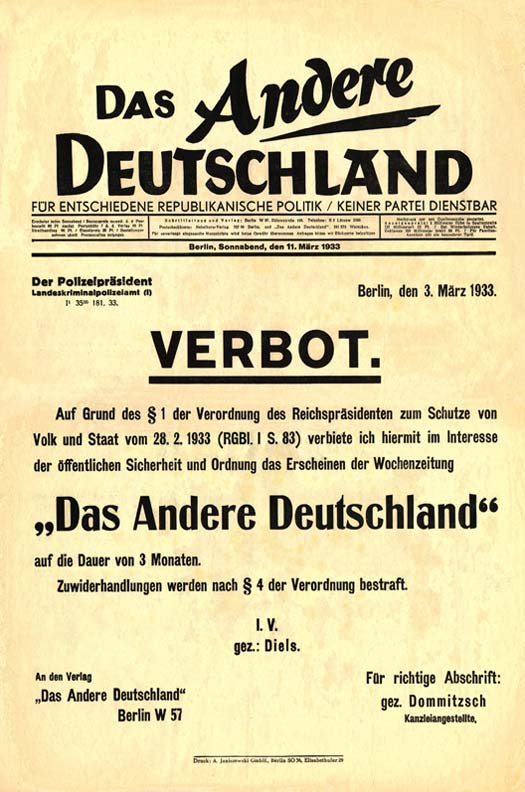On February 27, 1933, the Reichstag Fire broke out in Germany. This fire led to the infamous Reichstag Fire Decree that would eventually cement the authoritarian, police state power of the Nazi Party. It would also set in motion the ethnic and religious scapegoating the Party would use to further institutionalize its nationalist and genocidal campaigns.
The Origins of the Reichstag Fire
The Reichstag building was the location of the German Parliament, and in the 1930s, great concern grew regarding the security of the building due to concerns of political unrest. On the night of February 27, 1933, a fire broke out, cloaking the entire building in flames. The fire mysteriously started in the Session Chamber of the building despite the fact that it was unoccupied at the time.
An immediate response was made by both the police and the fire department, but the fire raged inexplicably out of control. Within a very short period of time, the Chamber of Deputies was totally ablaze. Upon arrival, the authorities immediately realized that the fire was the result of a deliberate arson.
The authorities performed a search of the building and found a young man named Marinus van der Lubbe, a member of the Communist Party. Concern had been raised in Germany over the anti-government activities of the Community Party and the discovery of van der Lubbe was presented as proof that communists were planning to overthrow the German government.
Hitler and the Aftermath of the Fire
Roughly one month prior to the fire, Adolph Hitler had become the Chancellor of Germany. In the aftermath of the fire, Hitler put enormous pressure on German President Paul von Hindenburg to issue a decree that would restore public order and address the threat of the Communist Party.
This was not the first decree sought by Hitler. On February 4, 1933, three weeks before the fire, Hitler had issued the Decree for the Protection of the German People. This was a Decree that restricted freedoms of the press and the assembly in Germany so as to prevent attempts at overthrowing the government. Even political meetings were outlawed under this decree. The public was willing to accept this Decree since it was meant to be a temporary measure. However, the Reichstag Fire Decree that followed would be a much more severe, and for all intents and purposes, a permanent decree.
The fire at the Reichstag occurred only a few days before the new parliamentary elections in Germany. Many conspiracy theories have purported that the fire was started by the Nazis in order to avoid the elections and assume total control over Germany. In truth, no one really knows for sure who started the fire and for what reason. It is very clear, however, that the Nazi Party used the fire to take advantage of the fears of the population. The fire was publicized as the first major threat of a communist overthrow of the government. Fearful that a Civil War was soon to break out, the German citizens were willing to allow Hitler extra-constitutional powers to deal with the perceived threat.
The Decree is Issued
On February 28, 1933, an improvised version of the Decree was issued and it was signed into law. The Decree essentially eliminated the vast majority of the freedoms presented in the Wiemar Constitution. Habeas corpus was suspended along with freedom of the press, association and assembly, expression, privacy, and all rights awarded to private property. Rights given to local municipalities were eliminated and replaced by central government authority. Literally overnight, Germany ceased being a democracy and became a government-controlled, totalitarian dictatorship. Such actions would continue in the aftermath of the Reichstag Fire Decree. The Enabling Act would be another measure the Nazi Party would put into effect. This Act gave Hitler the ability to create laws without going through the Parliament.
Text of the Fire Decree
Order of the Reich President for the Protection of People and State
On the basis of Article 48 paragraph 2 of the Constitution of the German Reich, the following is ordered in defense against Communist state-endangering acts of violence:
§ 1. Articles 114, 115, 117, 118, 123, 124 and 153 of the Constitution of the German Reich are suspended until further notice. It is therefore permissible to restrict the rights of personal freedom [habeas corpus], freedom of (opinion) expression, including the freedom of the press, the freedom to organize and assemble, the privacy of postal, telegraphic and telephonic communications. Warrants for House searches, orders for confiscations as well as restrictions on property, are also permissible beyond the legal limits otherwise prescribed.
The Legacy of the Decree
The legacy of the Reichstag Fire Decree was not so much one of a pivotal anti-communist action. Rather, the legacy of the Decree allowed for the complete and total control of Germany under Hitler and the Nazi Party. The result of this would eventually be World War II and the Holocaust.
